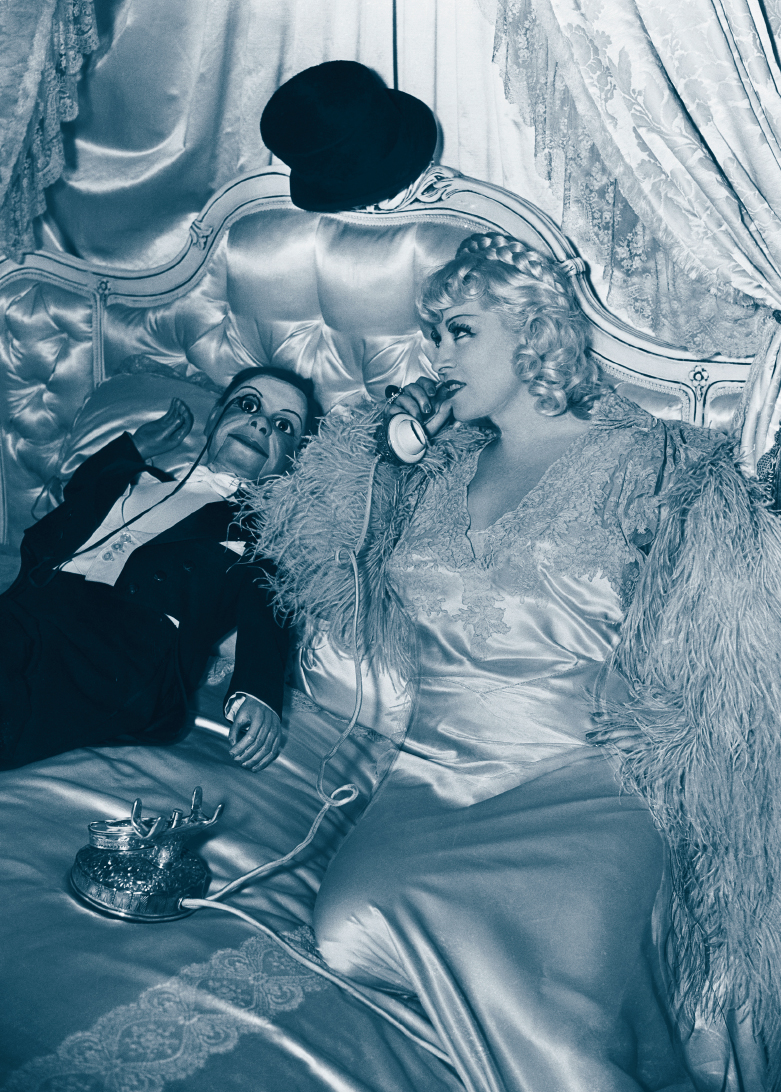Dirty Words, Indecent Speech, and Hefty Fines
In theory, communication law prevents the government from censoring broadcast content. Accordingly, the government may not interfere with programs or engage in prior restraint, although it may punish broadcasters for indecency or profanity after the fact. Over the years, a handful of radio stations have had their licenses suspended or denied after an unfavorable FCC review of past programming records. Concerns over indecent broadcast programming began in 1937 when NBC was scolded by the FCC for running a sketch featuring comic actress Mae West on ventriloquist Edgar Bergen’s network program. West had the following conversation with Bergen’s famous wooden dummy, Charlie McCarthy:
WEST: That’s all right. I like a man that takes his time. Why don’t you come home with me? I’ll let you play in my woodpile … you’re all wood and a yard long. …
CHARLIE: Oh, Mae, don’t, don’t … don’t be so rough. To me love is peace and quiet.
WEST: That ain’t love—that’s sleep.18
After the sketch, West did not perform on radio for years. Ever since, the FCC has periodically fined or reprimanded stations for indecent programming, especially during times when children might be listening.

The sexual innuendo of an “Adam and Eve” radio sketch between sultry film star Mae West and dummy Charlie McCarthy (voiced by ventriloquist Edgar Bergen) on a Sunday evening in December 1937 enraged many listeners of Bergen’s program. The networks banned West from further radio appearances for what was considered indecent speech.
In the 1960s, topless radio featured deejays and callers discussing intimate sexual subjects in the middle of the afternoon. The government curbed the practice in 1973, when the chairman of the FCC denounced topless radio as “a new breed of air pollution … with the suggestive, coaxing, pear-shaped tones of the smut-hustling host.”19 After an FCC investigation, a couple of stations lost their licenses, some were fined, and topless radio was temporarily over. It reemerged in the 1980s, this time with doctors and therapists—instead of deejays—offering intimate counsel over the airwaves.

The current precedent for regulating broadcast indecency stems from a complaint to the FCC in 1973. In the middle of the afternoon, WBAI, a nonprofit Pacifica network station in New York, aired George Carlin’s famous comedy sketch about the seven dirty words that could not be uttered by broadcasters. A father, riding in a car with his fifteen-year-old son, heard the program and complained to the FCC, which sent WBAI a letter of reprimand. Although no fine was issued, the station appealed on principle and won its case in court. The FCC, however, appealed to the Supreme Court. Although no court had legally defined indecency (and still hasn’t), the Supreme Court’s unexpected ruling in the 1978 FCC v. Pacifica Foundation case sided with the FCC and upheld the agency’s authority to require broadcasters to air adult programming at times when children are not likely to be listening. The Court ruled that so-called indecent programming, though not in violation of federal obscenity laws, was a nuisance and could be restricted to late-evening hours. As a result, the FCC banned indecent programs from most stations between 6:00 A.M. and 10:00 P.M. In 1990, the FCC tried to ban such programs entirely. Although a federal court ruled this move unconstitutional, it still upheld the time restrictions intended to protect children.
This ruling provides the rationale for the indecency fines that the FCC has frequently leveled against programs and stations that have carried indecent programming during daytime and evening hours. While Howard Stern and his various bosses held the early record for racking up millions in FCC indecency fines in the 1990s—before Stern moved to unregulated satellite radio—the largest-ever fine was for $3.6 million, leveled in 2006 against 111 TV stations that broadcast a 2004 episode of the popular CBS program Without a Trace that depicted teenage characters taking part in a sexual orgy.
After the FCC later fined broadcasters for several instances of “fleeting expletives” during live TV shows, the four major networks sued the FCC on grounds that their First Amendment rights had been violated. In its fining flurry, the FCC was partly responding to organized campaigns aimed at Howard Stern’s vulgarity and at the Janet Jackson exposed-breast incident during the 2004 Super Bowl half-time show. In 2006, Congress substantially increased the FCC’s maximum allowable fine to $325,000 per incident of indecency—meaning that one fleeting expletive in a live entertainment, news, or sports program could cost millions of dollars in fines, as it is repeated on affiliate stations across the country. But in 2010, a federal appeals court rejected the FCC’s policy against fleeting expletives, arguing that it was constitutionally vague and had a chilling effect on free speech “because broadcasters have no way of knowing what the FCC will find offensive.”20